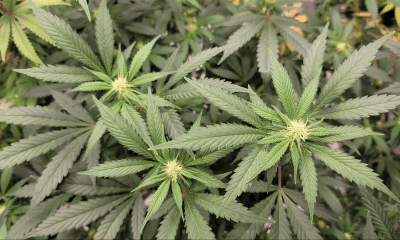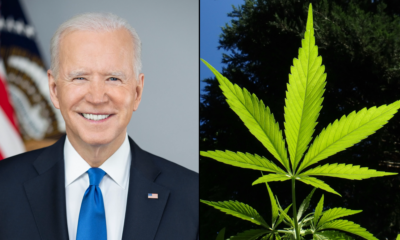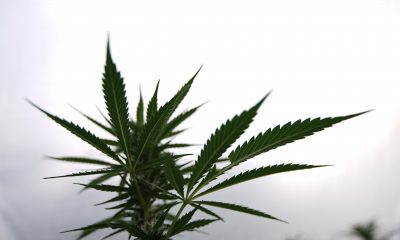Politics
Washington Lawmakers Introduce Long-Awaited Bill To Decriminalize All Drugs And Expand Treatment

Washington State lawmakers on Thursday introduced landmark legislation to decriminalize possessing small amounts of all drugs and expand treatment services for people with substance use disorders, part of a growing trend of U.S. states backing away from a crime-control model of drug enforcement and instead treating the issue as a public health matter.
“Substance disorder is among the only health conditions for which a person can be arrested for displaying symptoms,” says the new Washington bill, HB 1499, sponsored by Reps. Lauren Davis (D) and Kirsten Harris-Talley (D). “Treating substance disorder like a crime through arrests and incarceration further disrupts and destabilizes the lives of these individuals.”
The proposal would eliminate criminal penalties for possession of so-called “personal use amounts” of controlled substances and direct the Washington State Health Care Authority (HCA) to craft a plan under which “continual, rapid and widespread access to a comprehensive continuum of care must be provided to all persons with substance use disorder.”
📢 Announcing the Pathways to Recovery Act 📢
Join Treatment First Washington, Care First Washington, and Washington Recovery Alliance for a virtual press conference where we will discuss the details of the Pathways to Recovery Act. pic.twitter.com/0SAlCELkRQ
— Treatment First Washington (@Treatment1stWA) February 3, 2021
Voters next door in Oregon passed a similar policy change in November’s election. That law took effect this week.
Sponsors of the Washington bill, as well as advocates at Treatment First Washington, the group behind the proposal, discussed the proposal at a press conference Thursday.
“Recovery is predicated on hope,” Davis said at the event. “People recover not when we cast them out, but when we bring them in.”
Possession limits under the proposal, dubbed Pathways to Recovery Act, are not yet specified. They would be determined by September 2022 by an HCA workgroup, which the bill specifies must include people who currently use controlled substances as well as individuals in recovery. Law enforcement, prosecutors and public defenders would also be represented on the panel.
“Together they will design a plan to deliver increased pretreatment outreach so those who want to find the path to healing care get help finding it,” Harris-Talley said at Thursday’s press event, “and a plan to help folks with science-proven and science-based approaches to treatment and recovery support services throughout that process.”
While existing laws against drug possession would remain on the books, they would no longer apply to people who possess less than the “personal use amount” of a drug, defined by the bill as an amount “consistent with personal, nonprescribed use patterns of people with substance use disorder.” Individuals with prior convictions for activity decriminalized under the bill would be able to petition a court to vacate the conviction.
The measure would apply to all controlled substances, as well as counterfeit substances and prescription pharmaceuticals. Large-scale manufacture of controlled substances, as well as possession with the intent to sell, would remain illegal under the proposal.
“It’s time for smart, just and effective drug policy in Washington state,” said Sen. Joe Nguyen (D), the bill’s champion in the Senate. “We need a new approach to public health and safety, one that will begin to write the wrongs of the past for communities in rural and urban areas across the state. Clearly what we’re doing now isn’t working.”
Alison Holcomb, the political director for ACLU of Washington and an author of the state’s 2012 marijuana legalization initiative, told Marijuana Moment the decriminalization measure continues the organization’s overarching goal “to demonstrate that it’s possible to replace punitive responses to drug use with a public health approach, and achieve better outcomes for our communities.”
“We’re so excited by the huge coalition of legislators, directly impacted community members, public health experts, treatment and recovery professionals, and legal and law enforcement experts who also believe health works better than handcuffs,” Holcomb said, “and have come together to support passage of House Bill 1499, the Pathways to Recovery Act.”
Drug reform advocates in the state have been pursuing the policy change for more than a year, first pitching lawmakers in 2019 and, early last year, attempting to qualify a voter initiative for November’s election. When COVID-19 interrupted the signature gathering effort for the ballot, organizers vowed to again take the proposal to the legislature.
Advocates initially hoped to unveil the bill late last year but have repeatedly pushed back the announcement as they worked with lawmakers to finalize the measure’s language and sponsors.
One noteworthy change from past versions of the proposal is that HB 1499 appears not to tap into state cannabis tax revenue in order to fund expanded treatment services, as organizers previously indicated the bill might do.
—
Marijuana Moment is already tracking more than 500 cannabis, psychedelics and drug policy bills in state legislatures and Congress this year. Patreon supporters pledging at least $25/month get access to our interactive maps, charts and hearing calendar so they don’t miss any developments.
![]()
Learn more about our marijuana bill tracker and become a supporter on Patreon to get access.
—
“It would cut a significant hole in the existing fabric of the state budget if we were to use that particular source of funds,” Davis said.
Instead the Washington bill proposes “a funding framework in which, over time, resources are shifted from punishment sectors to community-based interventions such that community-based care becomes the primary strategy.” Treatment would be paid for by an individual’s public or private health plan or, in some cases, the state.
Other money, including funds from lawsuits against opioid manufacturers or “savings captured from reduced expenses for the department of corrections resulting from this act,” would supplement the program’s outreach and recovery efforts. Davis said Thursday she plans to introduce a separate bill that would seek funds from the alcohol and opioid industries.
“Really the focus is going to be on funding the two parts of the stool that are not funded … the outreach services pretreatment and then the recovery support system,” she said. “Those will be funded through a combination of sources, including a separate bill that has to do with increasing taxes and fees on the alcohol and opioid industries” as well as from the state’s general fund.
Oregon’s decriminalization law uses revenue from that state’s legal marijuana system to cover expanded treatment. That provision, however, is less popular among Washington lawmakers who rely on the marijuana’s greater-than-projected tax revenues to help balance the state budget.
Legislatures in a number of other states are also considering measures to roll back or eliminate criminal penalties for drugs.
New York lawmakers last month introduced legislation that would remove criminal penalties for simple drug possession and instead impose a $50 civil fine. In California, Sen. Scott Wiener (D) has said he plans to introduce a measure to decriminalize specifically psychedelic drugs, such as psilocybin mushrooms, ibogaine and DMT. That bill is expected later this month.
Lawmakers in New England are exploring similar changes. In Massachusetts, state Rep. Mike Connolly (D) told the Boston Globe this week he’s preparing legislation to study decriminalizing psychedelics and certain other drugs as well as legalizing the therapeutic use of psilocybin —another policy change already adopted in Oregon. A Maine legislator has made similar statements, though so far no bill there has been introduced.
Meanwhile, some advocates are already predicting that 2022 will see a flurry of drug reform measures on ballots in states around the country. Dr. Bronner’s CEO David Bronner, a key financial backer of Oregon’s successful decriminalization and psilocybin initiatives told Marijuana Moment in November that he’d like to see both changes come to Washington state by next election.
“It’s moving faster than I would’ve though,” Bronner said of the push for decriminalization. “I would not have thought we’d be ready for the kind of reforms we’re seeing, and it’s gratifying. I just think we can go further in 2022 and 2024.”
Cambridge City Council Decriminalizes Psychedelics And Urges Police To End Drug Arrests More Broadly
















